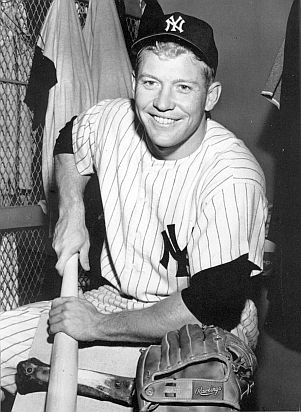 Mickey Mantle is a name you've likely heard. You're probably not going to learn, here, that Mantle was a good player, or a popular one, or a serious alcoholic, but what is clear, and the reason he's being written about in this series, is that Mantle was very much a phenom.
Mickey Mantle is a name you've likely heard. You're probably not going to learn, here, that Mantle was a good player, or a popular one, or a serious alcoholic, but what is clear, and the reason he's being written about in this series, is that Mantle was very much a phenom.Mantle's pro career began as a teenager with the Baxter Springs Whiz Kids in Kansas. After a scout observed him belting home runs into a river well beyond the stadium's outfield fence, he was courted by the Yankees, who had to wait until his high school graduation until signing him as a 17-year old in 1949. After two years of seasoning (he slugged .638 in the Western Association in 1950), he made his Yankee debut in 1951 at 19 and never looked back.
There is little point discussing what Mantle could do on a baseball field. He cranked homers that cleared bleachers, hitter's backdrops, and routinely completely left ballparks. He had an infamous 1936 date with the right-field facade at Yankee Stadium. When he wasn't busy raking (he had an unbelievable .617 slugging % from 1955-1963, and retired with a .977 OPS (177 OPS+)) he was playing a capable center field -- at least when his knees were only really bad -- and stealing double-digit bases.
Mantle's issue was never talent, but health. He had chronic pain in both knees while in high school, and he suffered a horrific injury in the World Series as a 19-year-old rookie which some speculate may have been an untreatable ACL tear that he played with FOR THE REMAINDER OF HIS 18-YEAR CAREER. At various points in his career, he would break his ankle, ruin his hip after a medical injection, jack up his shoulder, and by the end of his career, had to collapse to one knee from pain after swinging. He could no longer run, throw, or hit from the left side, but Mantle continued to dominate on sheer talent and alcohol-fueled determination (did I mention he was a severe alcoholic?). In his last three seasons, he posted an OPS+ of 153, meaning he was still 53% better than the average AL hitter.
Mantle was incredibly talented, but he was also insanely popular. He was expected by New York brass and fans as the heir apparent to the Joe DiMaggio Yankees, and when he came up as a rookie he was originally issued number 6 to continue the lineage of Babe Ruth (3), Lou Gehrig (4), and DiMaggio (5), though he would switch to number 7 and have that number retired instead. His strong jaw, bulging muscles, exciting athleticism and the ability to hit a baseball 500 feet made him one of the biggest fan favorites in MLB. An interesting perspective on Mantle's popularity is given here:
"Mantle's rise in popularity paralleled the rise in America's obsession with the television. When he started playing in 1951, baseball was at the peak of its popularity. After the war, the country flocked to ballparks and gathered around radios (and televisions, if they could find them). With Mantle's strong bat, his good looks and charm, the chance that when you tuned into a Yankee game you might see or hear Mickey hit one out of the park sparked excitement in fans of every age.
In addition to his individual appeal, Mantle played on the New York Yankees, a team that had, of course, the legend of The Babe. Yankee Stadium was "the House that Ruth built," and add to that Willie Mays concurrently playing center for the New York Giants, and Duke Snider in center for the Brooklyn Dodgers, and New York was a media frenzy. When the Yankees made it into their innumerable World Series games in the fifties, fans would remember Mickey Mantle as the hero of many of the games."
One of the gam e's all-time very best players, The Mick's carried the legend of the golden-era Yankees with him while he played, and his own legacy lasted well beyond his 1968 retirement and his 1995 death (like, a really bad alcoholic). Mantle's career was kind of, appropriately, in the latter stages of baseball's golden era, a time of unprecedented popularity in the sport, and Mantle exemplified both the excitement and interest surrounding baseball in the immediate post-war era, as well as the slow corrosion of that fanbase until the late 1970's. For a time, and for many still, Mickey Mantle was baseball.
e's all-time very best players, The Mick's carried the legend of the golden-era Yankees with him while he played, and his own legacy lasted well beyond his 1968 retirement and his 1995 death (like, a really bad alcoholic). Mantle's career was kind of, appropriately, in the latter stages of baseball's golden era, a time of unprecedented popularity in the sport, and Mantle exemplified both the excitement and interest surrounding baseball in the immediate post-war era, as well as the slow corrosion of that fanbase until the late 1970's. For a time, and for many still, Mickey Mantle was baseball.
Tidak ada komentar:
Posting Komentar